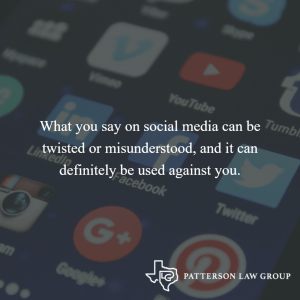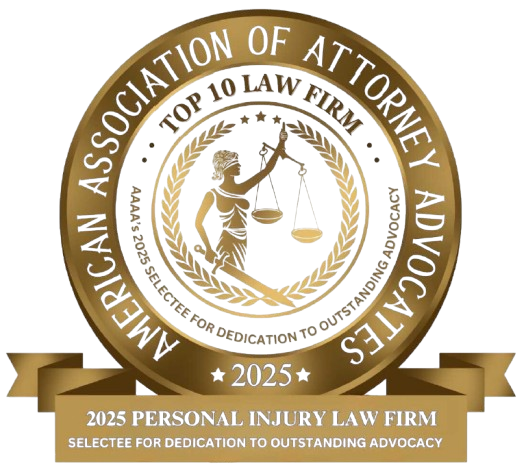
Social media has become a way of life in today’s world. It’s a way to connect with family and friends, and most people share their thoughts with their inner circle without giving it much thought. For many aspects of life, there is nothing wrong with that. But, if you have been injured in an auto accident and your claim hasn’t been settled yet, what you say can be twisted or misunderstood, and it can definitely be used against you.
How Social Media Battles Play Out in Court
You may have seen stories in the news about how an individual’s social media posts resulted in adverse employment actions against them. Unfortunately, social media accounts can have equal or more significant negative consequences in negligence lawsuits. This is particularly true if you are suing to collect damages for injuries caused by someone else’s negligence, but your social media accounts do not reflect this.
To forestall those adverse consequences, accident and injury attorneys in Texas and elsewhere might try to limit or exclude the use of an accident victim’s social media posts–based on hearsay or some other exclusion under the evidence code. Those challenges will almost always fail, however, because a court will allow into evidence a person’s out-of-court statements that are contrary to other evidence and testimony given in court.
Your lawyer might have a better opportunity to challenge the admission of your social media posts by arguing that they are irrelevant to the issues at hand. Assume, for example, that you are suing a motorist who negligently crashed into your car, causing you to injure your back. If your social media posts are limited to comments that have nothing to do with a back injury and do not show you moving in a way that contradicts the existence of that injury, those posts will have little or no bearing on your case. Alternately, suppose your posts show you running, dancing, or engaging in other vigorous activities. In that case, the negligent party’s lawyer will inevitably use them against claims for pain and suffering that you might have made in your lawsuit.
You cannot shield the admission of your social media based on the privacy settings you have erected in your accounts. Regardless of those settings, your statements on social media are available to the general public. If they contradict the claims you have made in your accident and negligence lawsuit, you will likely lose any battle to keep them out of court and away from a jury’s assessment.
Your Texas accident and negligence attorney will tell you to stay off of social media until after your lawsuit has been resolved. Avoiding social media will always be your safest and best strategy.
Four Ways Social Media Can Have Negative Repercussions on Your Personal Injury Claim
Social media has never been more popular. However, while it is an excellent option for sharing pictures of pets or updates about your family, there is a downside. For example, if you discuss your personal injury case or even your health following an accident, you could be putting your claim at risk. There are multiple reasons that your social posts could work against you during your case, and they include the following:
- Contradicting prior testimony. If you have given a statement or testified about what happened in your accident, inconsistent comments or descriptions you make on social media could be held against you. This could involve contradicting your version of events or the severity of your injuries.
- Revealing your physical condition. The amount of money you receive in a personal injury settlement can be affected by the extent your injuries prevent you from participating in normal activities. Posting on social media can be especially problematic if you engage in activities that appear at odds with your stated limitations. For example, if you claim that your injuries prevent you from participating in yoga classes but then post photos of yourself in a class, an insurance adjuster could use that as evidence that your injuries are not as serious as you claim.
- Disparaging comments. Making disparaging comments about the other parties involved in the case on social media could also work against you. This is true not only of the defendant but also of the insurance company and opposing lawyers in your case.
- Locking in a story. If you have not yet given a formal statement in your case, there is no prior statement to which your trial testimony can be compared. However, by discussing your accident on social media, you open yourself up to being cross-examined about the details at trial.
Rethink Your Social Media Habits
If you are in the habit of posting everything you do on social media, it’s time to get out of that habit. Some things you post can damage your credibility or be taken out of context. Examples include:
- Constant venting, including swearing
- Indulging in adult beverages
- Shares about prior lawsuits you have been involved in
- Bragging about exaggerating the pain you are in
- Bad mouthing the other party
- Comments that could be interpreted as admitting you were at least partially at fault
- Comments that cast doubt on whether you are genuinely suffering
Things that are posted on social media can come back to haunt you even after posts are taken down. A good approach is not to post anything on social media while your claim or lawsuit is pending.
The Insurance Company is Watching You
When you are trying to receive just compensation for your injuries, remember that the insurance company wants to find a reason not to pay you, and they will do just about everything they can to avoid it.
They may hire a private investigator to watch your behavior, including what you post on social media. Even if you are not posting pictures of outrageous behavior, pictures of carrying heavy things (including children) or participating in athletics could be used against you as evidence that you are not really as injured as you say you are.
Keep Friends and Family from Posting About Your Accident
Even if you refrain from posting anything that could hurt your case, your friends and family might say something they shouldn’t and tag you in the post. Talk to anyone you think might do this and ask them to avoid posting anything about you without your consent.
Even posts that seem innocent, such as pictures that show you vacationing or relaxing, might be used to imply that your quality of life has not suffered in any way, and that your physical or mental injury claims have been exaggerated.
What About Private Posts?
While you may think your privacy settings protect you from people who you don’t wish to view your posts, there is no guarantee of that. Friends may unknowingly open up your posts to be viewed by others if they tag you.
Once an insurance company has seen something you have posted, the information can be used against you. Insurance companies may also obtain information through a court order. You should keep in mind that there is no guarantee of privacy on social media. Always keep a very low profile while you are in the claims process.
Watching What You Say May Not Be Enough
Being careful not to talk about the accident may not be enough to protect you. Posting and commenting constantly may be interpreted as evidence that you are feeling perfectly fine and that your demeanor is upbeat so your injuries can’t be as bad as you say they are.
The best approach is to stay off social media altogether until your case is settled. While that may seem extreme, you will feel much worse if it comes out later that social media damaged your case leaving you with lower compensation than you should have received.
Contact Patterson Law Group for Texas Personal Injury Claims
If you have been hurt in a car accident due to someone else’s negligence, we are here to help. Contact Patterson Law Group by filling out the form on this page and one of our attorneys will be in touch very soon.










